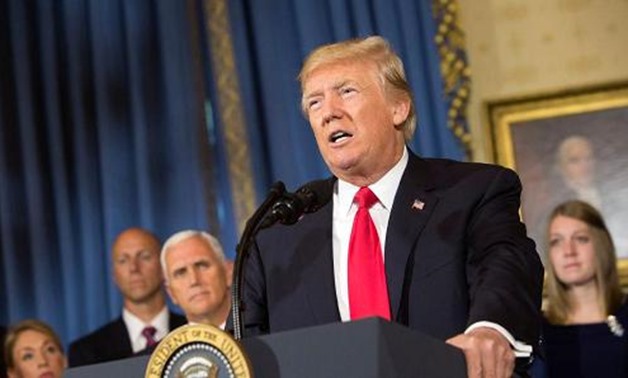
U.S. President Donald Trump - Reuters
BEIRUT/WASHINGTON - 8 April 2018: U.S. President Donald Trump said on Sunday there would be a "big price to pay" after medical aid groups reported dozens of people were killed by poison gas in a besieged rebel-held town in Syria.
As international officials worked to try to confirm the chemical attack which happened late on Saturday in the town of Douma, Trump took the rare step of directly criticizing Russian President Vladimir Putin in connection with the incident.
The Syrian state denied government forces had launched any chemical attack and Russia, President Bashar al-Assad's most powerful ally, called the reports bogus.
"Many dead, including women and children, in mindless CHEMICAL attack in Syria. Area of atrocity is in lockdown and encircled by Syrian Army, making it completely inaccessible to outside world. President Putin, Russia and Iran are responsible for backing Animal Assad. Big price to pay," Trump wrote on Twitter.
The White House declined to clarify what consequences Trump had in mind. Last year, the United States launched a cruise missile strike on a Syrian air base days after a sarin gas attack in northwestern Syria blamed on Assad.
The Russian Foreign Ministry warned against any military action on the basis of "invented and fabricated excuses", saying this could lead to severe consequences.
A joint statement by the medical relief organisation Syrian American Medical Society (SAMS) and the civil defence service, which operates in rebel-held areas, said 49 people had died in the attack. Others put the toll even higher.
The United Nations Security Council is likely to meet Monday afternoon on the chemical attack at the request of the United States and eight other members, diplomats said.
'HORRIBLE' IMAGES
Last week Trump said he wanted to pull U.S. troops out of Syria, though his advisers have urged him to wait to ensure Islamic State militants are defeated and to prevent Assad's ally Iran from gaining a foothold there.
There are about 2,000 U.S. troops on the ground in the country working to help fight Islamic State militants.
A top Trump security aide said on Sunday the United States would not rule out launching another missile attack. "I wouldn't take anything off the table," said Tom Bossert, the White House Homeland Security and Counterterrorism Adviser, in an interview on ABC's "This Week."
"We are looking into the attack at this point," he said, adding that the photos of the incident are "horrible."
In one video shared by activists, the bodies of around a dozen children, women and men, some with foam at the mouth, were seen. "Douma city, April 7 ... there is a strong smell here," a voice can be heard saying.
Reuters could not independently verify the reports.
One factor in Trump's decision to bomb Syria last year was the television images of dead children.
Trump will be joined at the White House on Monday by John Bolton, who takes over as White House national security adviser.
Trump has shaken up his core national security team in the past two weeks, replacing national security adviser H.R. McMaster and firing Rex Tillerson as secretary of state.
Bolton, a hard-charging former UN ambassador, praised Trump's missile response last year, though he has generally focused more on Iran as a bigger national security threat.
Trump was set on Monday to talk with senior military leadership at a previously scheduled meeting at the White House.
U.S. Defense Secretary Jim Mattis had warned in March during a trip to Oman that chlorine attacks would be "very unwise," saying Trump had "full political maneuver room" to respond, though he stopped short of threatening retaliation.
SHELTERING IN BASEMENTS
The Syrian Observatory monitoring group said it could not confirm whether chemical weapons had been used in the attack on Saturday. Observatory Director Rami Abdulrahman said 11 people had died in Douma as a result of suffocation caused by heavy bombardment.
Medical relief organisation SAMS said a chlorine bomb hit Douma hospital, killing six people, and a second attack with "mixed agents", including nerve agents, had hit a nearby building.
Basel Termanini, the U.S.-based vice president of SAMS, which operates medical facilities and supports medics in Syria, told Reuters another 35 people had been killed at a nearby apartment building, most of them women and children.
The joint statement from SAMS and the civil defence said medical centres had taken in more than 500 people suffering breathing difficulties, frothing from the mouth and smelling of chlorine.
Tawfik Chamaa, a Geneva-based Syrian doctor with the Syria-focused Union of Medical Care and Relief Organizations (UOSSM), a network of Syrian doctors, said 150 people were confirmed dead and the number was growing. "The majority were civilians, women and children trapped in underground shelters," he told Reuters.
Douma is in the eastern Ghouta region near Damascus. Assad has won back control of nearly all of eastern Ghouta from rebel groups in a Russian-backed military campaign that began in February, leaving just Douma in rebel hands.
The Ghouta offensive has been one of the deadliest in Syria's seven-year-long war, killing more than 1,600 civilians, according to the Syrian Observatory for Human Rights.
Taking Douma would seal Assad's biggest victory since 2016, and underline his unassailable position in the war that has killed hundreds of thousands of people since it mushroomed from protests against his rule in 2011.

Comments
Leave a Comment